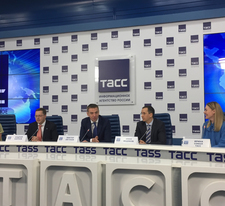NAST Conference: New opportunities for Retail
On April 21, the annual meeting of members of the National Association of Network Trade Participants (NAST) was held in Moscow.
At the conference, special attention was paid to the discussion of FZ-54, which obliges retailers to switch to a new online fiscalization system. NAST actively participates in discussions of problems related to the implementation of FZ-54, acting as a mediator between the tax service, cash register suppliers and retail representatives.
The Association analyzed the benefits for retailers from the transition to new CCTS and voiced the following factors:
- whitewashing the market, leaving unscrupulous competitors, creating uniform conditions for everyone;
- clear interaction with the Federal Tax Service;
- fast online registration, re-registration of cash registers;
- uploading data from the OFD for tenants;
- refusal to print KM1 - KM9 report forms in salons;
- the possibility of operational control over the operation of cash registers (if the OFD has a mobile application);
- rejection of paper checks in the future;
- getting enlarged analytics from the OFD in the future;
- unloading of receipts from the OFD for any period (under lease agreements, the lessee is obliged to provide copies of cash documents at the request of the lessor).
NAST is working on the possibility of simplifying the registration of refunds in salons (the ability not to form an RKO for each case of a refund to the buyer).

Taking into account the fact that the reform can be recognized as having taken place, the issues of new opportunities that open up for business were raised during the conference.
Touching upon the current situation with the transition to online sales registers,Alexey Krasnopolsky, Product Director of the company «First OFD», recalled that, according to FZ-54, retailers should switch to a new type of CCT. They, in turn, transmit online through fiscal data operators all information about the purchase to the Federal Tax Service. Huge amounts of information pass through the operators of fiscal data and, as required by law, they are transferred to the tax service. However, as Alexey Krasnopolsky noted, it is possible and necessary to work with this data without violating someone's rights and without transferring them to third parties. "It's just that sales data may not be as interesting as data comparable to customer information. This way a business can understand who its buyer is," the speaker stressed, adding that such information is very useful for targeted advertising.











